Young Gods - Interview
by Paul Raven
published: 18 / 5 / 2007
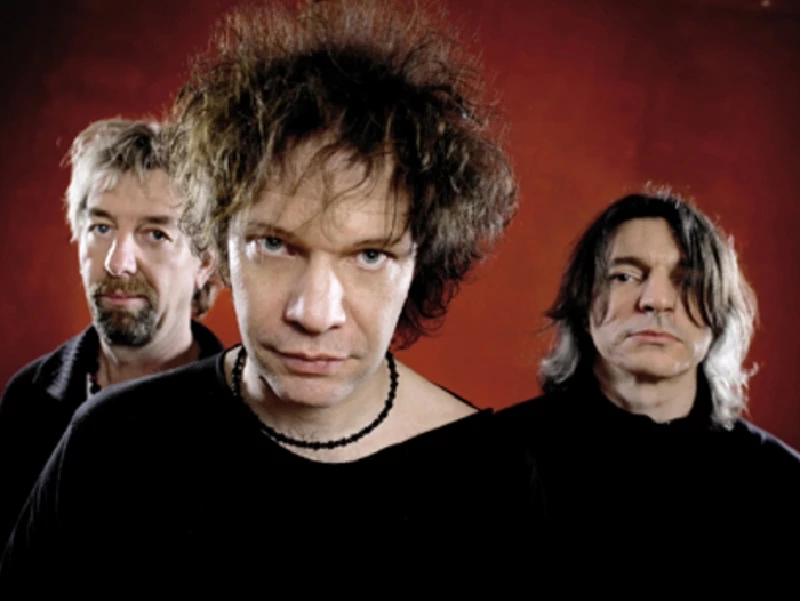
intro
Seminal Swiss act the Young Gods recently released their first album in seven years, 'Super Ready/Fragmente'. At a show in London, Paul Raven speaks to front man Franz Treichler about the group's recent return to their industrial roots and the violence that has inspired the new albun
A little after half past nine the lights go down in a basement venue by Camden Lock, and the expectant audience turns its attention to the stage. The PA is now exuding loops of metallic sounds that appear distantly related to the squeal of fingers on the fretboard of an amped-up electric guitar, interspersed with the subliminal bubbling of filtered sawtooth synth tones. Three men on the younger edge of middle age take the stage: one behind a drum kit; one behind a huge Akai sampler; one stood in the centre behind a microphone. A sparse pattern of kick drum and hi-hats heralds the arrival of a throbbing bassline, and the crowd roars out its enthusiasm. The Young Gods are back, playing a single UK date on a tour in support of their latest album, 'Super Ready/Fragmente'. Formed in 1985 from the ashes of a new wave punk outfit, the Young Gods have been exploring the far edges of musical culture ever since. Their early adoption of sampler technology as an instrument rather than a studio tool put them out in front of their contemporaries right away, and they can still lay claim to having a unique and idiosyncratic approach to songwriting today. 1992's 'TV Sky', despite never being a huge success in commercial terms, is considered to be one of the seminal industrial albums, and has been name-checked as an influence by artists including Ministry, Devin Townsend and David Bowie. Much like their musical history as a band, the tour is really a patchwork of different events, as lead singer and founder member Franz Triechler explains: “We're not even half way through, but it's not like a big tour. We started two weeks ago, but in between we did some acoustic shows ... it's a bit like we do a week of electric things, then a week of something different ... and then in June we start another project, and play some festivals in the summer.” So, how have the shows been going? “The response has been good: people are happy about the new record, you start to see a reaction ... it's been on the market, what, two weeks, three weeks maximum? We've had some good shows, and I'm looking forward to tonight.” Later on, as the band pick up the pace of their set, it's plain to see that they're giving it everything they have, and enjoying themselves immensely in the process. The wide-screen field of sampled sound supports Franz's sonorous voice as he leaps and prances around the small stage, delivering lyrics that verge on being beat poetry – sometimes obscure and surreal, but pregnant with meaning. The new album is, in part, concerned with the place of weapons and violence in modern culture – a theme that many British people might be surprised to find in the work of a band from Switzerland. “It's a global problem ... but Switzerland has some kind of violence that isn't comparable to England, some kind of deep hidden thing, I don't know where it comes from ... it's not so much of a surface thing [as it is in the UK]. There's a lot of economic violence, things that people aren't proud of ... there are a lot of suicides or attacks with weapons in Switzerland; it's a small country, and if you look at the figures it's kind of impressive. One of the main Swiss economic forces is the weapons industry - they sell a shit-load weapons all around the world, you know! It's a neutral country, but there's a lot of contradictions." “In 'Super Ready/Fragmente' there's a lot of motivation - I don't want to say inspiration - to write about cultural tradition and the glamorisation or glitter-isation of violence ... the cover [a pistol draped in glittering fabric] is a metaphor for that: what is our relationship with weapons, with violence? Why do we use it in everyday life, you know, in commercials to sell things, the business of fear? To not play blind is one of the biggest motivations in that record. There is a line in 'Freeze' that I really like, something I read about: statistically, if you divide the known amount of explosives on the planet by the number of people living on the planet, each one of us is equal to four tons of TNT - I think it's important to know that." “I think music has a huge power of suggestion, and when you mix it with words you can develop some kind of language people can understand. You don't have to intellectualise, it's very physical ... it takes us to some kind of unknown territories, emotionally.” So, are they aiming for the heart rather than the head? “You could say so. But it's like I said earlier, you know, about what's behind the words - a little bit of thinking is fine, but the first motivation is something more raw.” After the turn of the millennium, Franz and the band wandered away from the industrial sound that the Young Gods were best known for, and ventured into the territories of ambient electronica. This was less of a radical change of direction than a shifting of focus onto a different aspect of their art, but until now the fans of their harder edged material have had to be content with 'XXV', the 'Best Of' album released in 2005. The release of 'Super Ready/Fragmente' sees them returning to their home turf, armed with new maps and esoteric wisdom unearthed on their journeys, and once again making the cutting edge of heavy music their rightful domain. The sound of the band on stage is explosive in its own right – layers of distortion, sampled snippets of guitar collaged into a landscape of tone that you almost feel you could climb inside, like some vast machine or factory. The new album is a return to what many consider to be the 'classic' sound of the Young Gods – have they made a deliberate return to the aesthetics of the album 'TV Sky' ? “Sure - we've probably assimilated a lot of what we've done in the past five, six years with the more electronic sounds .... a lot of the guitar textures are morphed with, you know, insect sounds or something, so we include the approach from that period ... but we wanted to have a heavier sound again.” With a career more than two decades long, this continual reinvention plays a part in keeping the band interested in their own work. “Yeah, basically ... we enjoy what we do because sometimes we start a different approach, like now we're doing some acoustic stuff to challenge ourselves ... when something becomes a cliché, we kind of need to have a different approach, to learn something ... that's why we put the guitars aside on 'Second Nature'(2003 album-Ed), and that's why we need them back now - we missed them!” It seems the audience missed them too – the reception for the heavier tunes is nothing short of rapturous. The Young Gods tend to be classified as 'industrial', but their approach differs from that of a great many bands of that genre – most notably in the way they use tiny pieces of guitar sound, rather than whole bars or riffs. “Well, I like riff-orientated music, and a lot of the Young Gods' bigger hits are riff-orientated anyway ... but I think I'm a little bit bored of the looping technique, whether in techno or industrial or whatever ... the whole concept of writing music by moving blocks around, one after the other - it's just not that interesting any more. It's not that I'm trying to stay away from that, I just think ... you know, riffs are something very powerful, but our goal is not to try to be the most massive sounding band in the world, because that's not very interesting either. It's easy nowadays to stack layers of sound in the studio and just punch somebody in the face, make them think 'Wow, this is so powerful!'” Maybe sounding massive isn't one of their goals, but the intensity of sound produced by the sampler on stage puts any number of self-proclaimed huge-guitar-sound acts to shame. These songs do not rely on the simple linear structures of rock and pop music, but draw on wider influences from electronica to classical. Where does one start, building sonic architecture like this? “Most of the time it comes from sounds. I have a lot of little pieces of words, of stuff I've written down during the day, titles ... some of it becomes relevant to the atmosphere of the sounds ... but most of the time it's just the sounds, or the beats.” The guitar sounds, especially – some of which are made specially in the studio by the band themselves, but others which (more so in the earlier days of the band) were plucked like driftwood from the ocean of musical culture. Did sampling the work of other artists ever land the Young Gods in legal trouble? “We had to work with an American 'sample doctor' when we signed to Interscope in the US. It was clear in the contract that we had to take care about the clearance of the samples. She was a very cultivated lady, and she recognised a lot of stuff, but not all of it ... and she was like, "oh, this bit is from Nirvana; well, we can get away with this one, but this ... oh, no, this is Prince, that's very bad - any samples of Prince, you're going to have to pay 50% of the whole copyright of the song, even if it's just like two seconds!" There were songs we had written and had to get cleared, but the people didn't even listen ... we'd send them the demos and they'd just say "no fucking way", but the songs were already on the record, so we said OK, let's just go for it.” Is this more of an issue now, in a climate of copyright paranoia from the major labels? “I don't know if it's harder nowadays, there's so much music on the internet ... I have no idea if people would give you trouble. But anyway, we never sampled people to make a statement. It was more because we liked their sound, you know ? We've never had any problems with anybody so far.” During the show, the title song from the new album sends waves of guitar through the crowd, punctuated with skittering sounds that make your spine crawl, the scraping of metallic fingers down a blackboard in the next dimension along from this one. A lot of bands use samples now, but they aren't as integrated into the songs as they are here. But then, the Young Gods have had a lot of practice – Franz brought electronics into the picture way back in 1985. “The sampler opened up a whole new landscape of sound which I was dreaming of at that time ... I was in a guitar band then, but because of the technology, we could include sounds from the street, from orchestras ... it's like a tribute to sound. Your way of writing music changes completely. You're not going to have to think about chord changes, tuning the guitar, being in 'A' or 'E', or whatever; it's just sound, purely sound. This was sort of a revolution, and I first included the sampler in the guitar band and then I thought, nah, let's get rid of the guitar, try to see how far we can go with this!” Toward the end of their set, the band play some of the slower, more psychedelic numbers which have always been a part of their repertoire. Along with their forays into ambient electronica, it's clear that they aspire to doing more than just walls of squalling guitar. “We want to release a record with some acoustic versions, some kind of 'Best Of' ... we put that together for a live show, and I think it works well ... we're recording it right now, we should finish it in the summer, try to have it out by Christmas or January. We've already started working on the next record, too ... we want to recuperate the time lost during the more obscure periods of the band!” The UK may have missed the Young Gods, but they're not holding a grudge. How could they, when the band play a relentless 90 minute set, complete with two encores and scattered with all the back-catalogue classics? The band's influence on many other artistes is well documented, but they're not resentful of their comparative obscurity. “My definition of success is ... being happy to do the music you love to do without compromising, to have a good team of people. That's success for me.” The band's happiness is plain in their wide smiles as they leave the stage after the final encore – a happiness matched by the crowd, who applaud and stomp and whistle until the lights come up again. A lot of them (including myself) have come a long way to see this sole UK date on the 'Super Ready / Fragmente' tour, and they'll probably be happy to hear that the band intend to return to these shores around October or November this year, to play some shows in venues outside London. Do yourself a favour, and make sure you go and see them when they do.
Picture Gallery:-
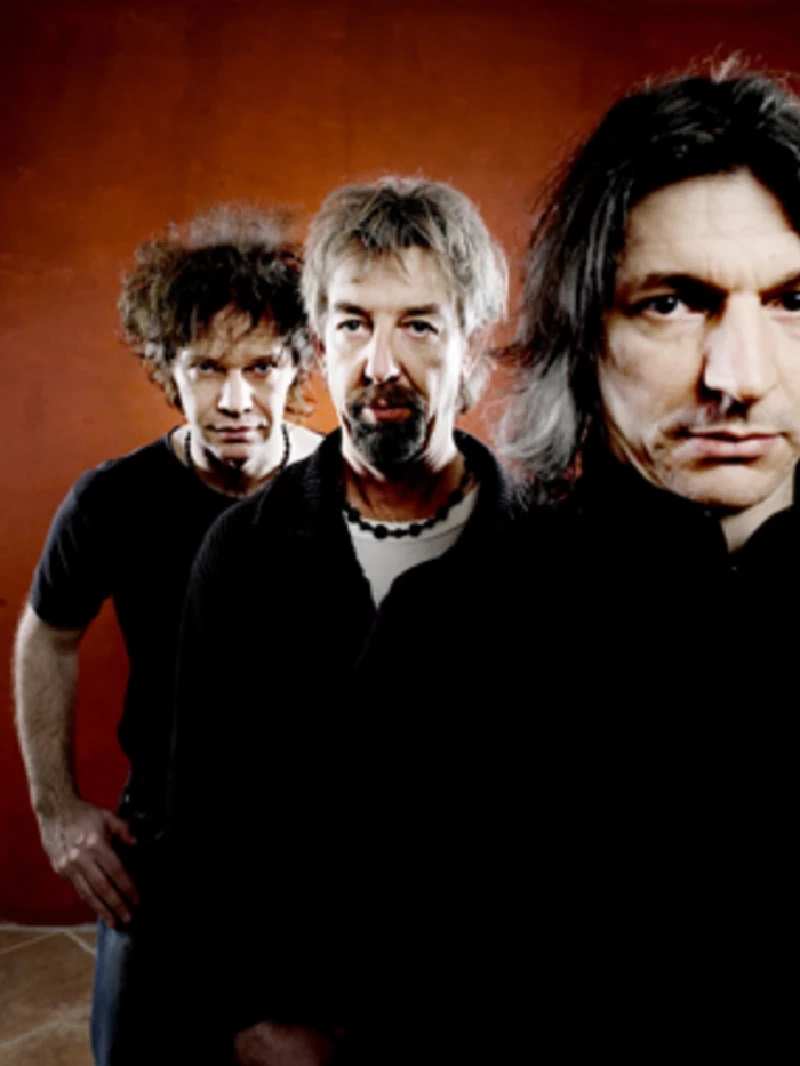
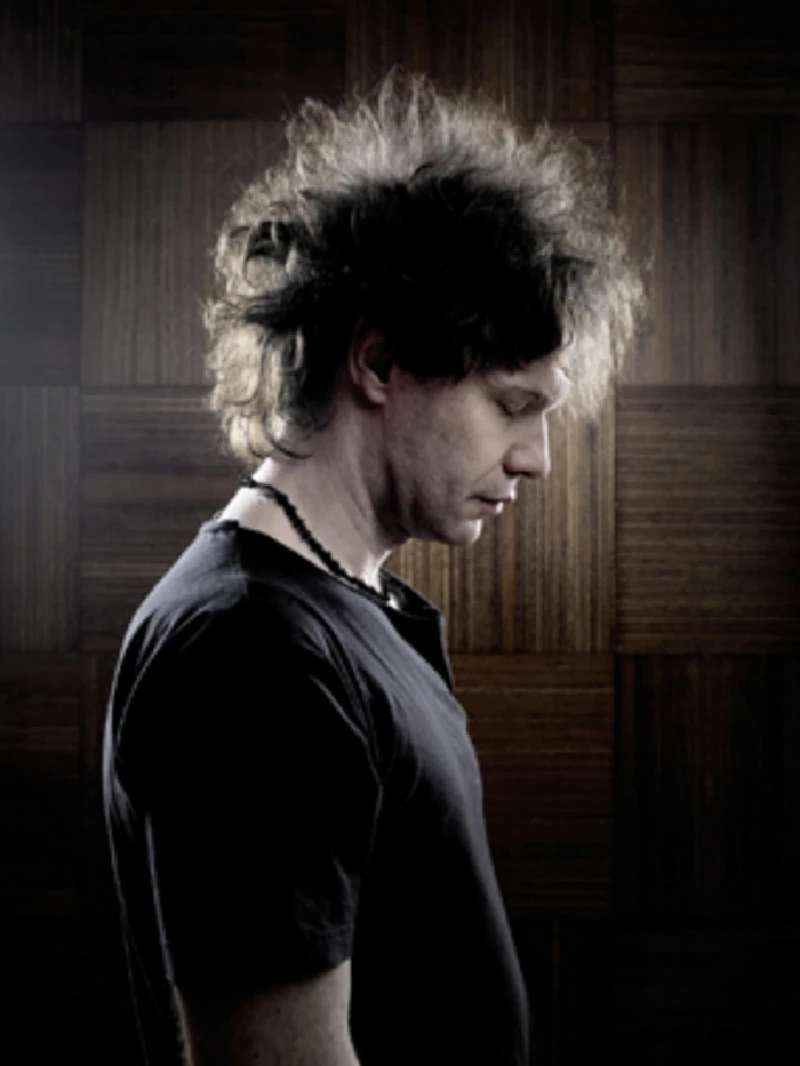
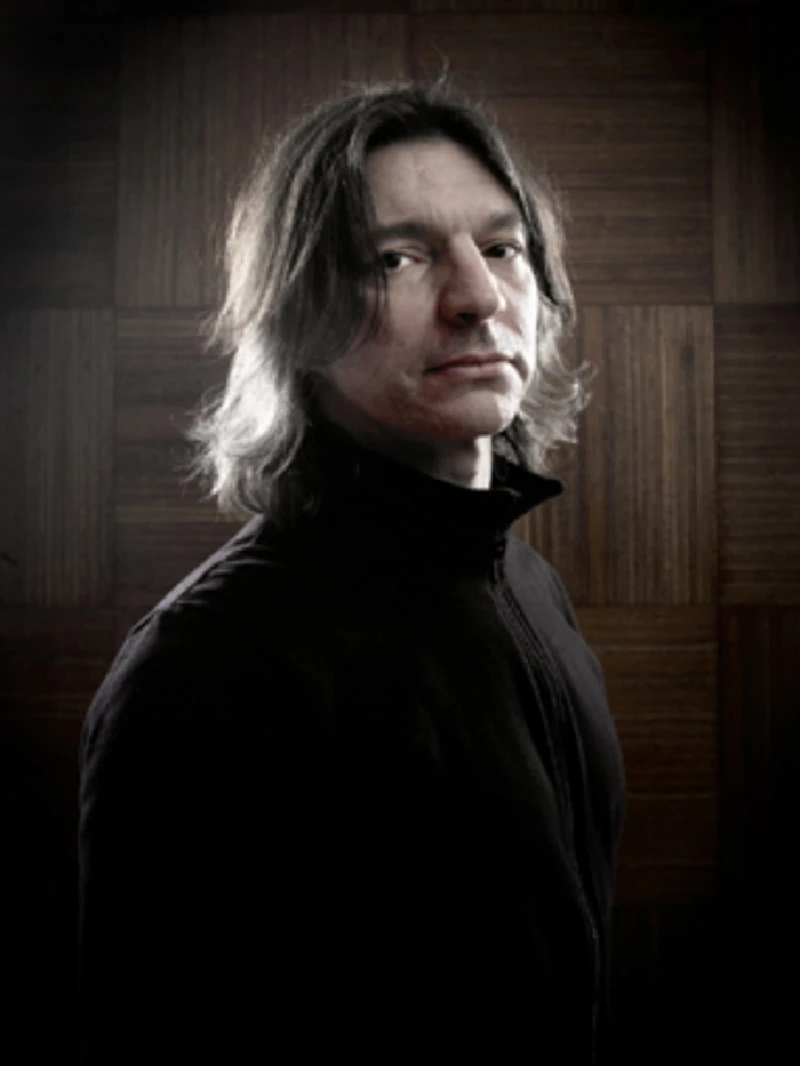
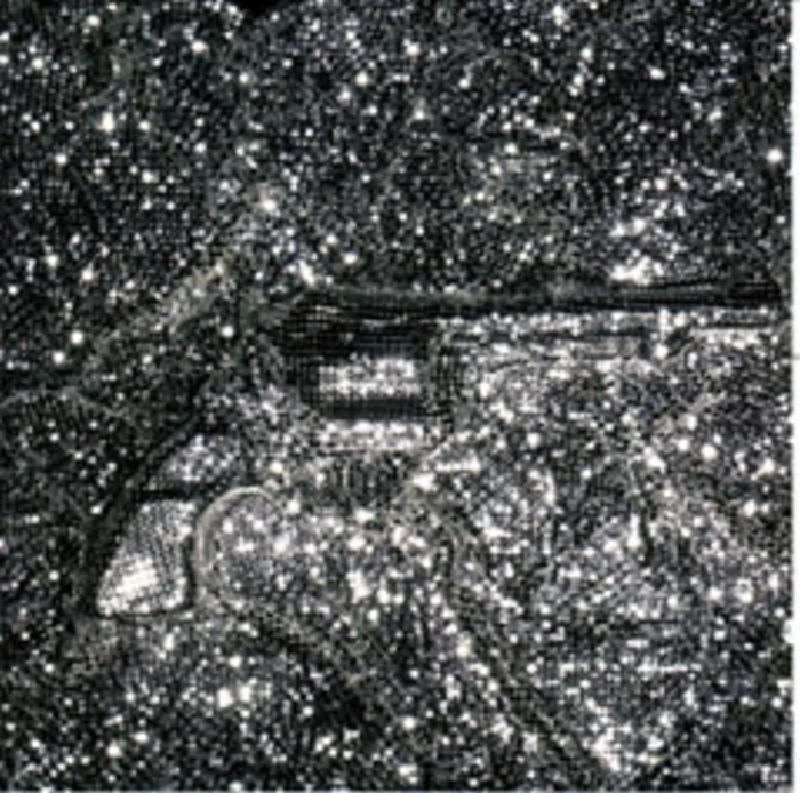
live reviews |
|
Fibbers, York, 27/11/2007 |
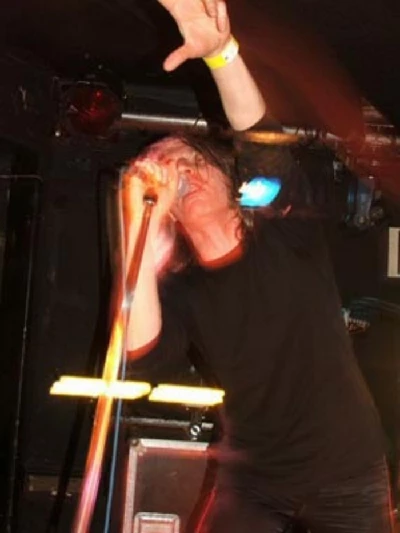
|
| Russell Ferguson finds the energy and power of both durable Swiss rockers the Young Gods and new band Undercut's performances totally compelling at Fibber's in York |
reviews |
|
Super Ready/Fragmente (2007) |
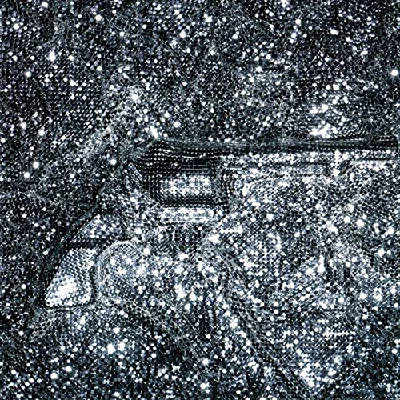
|
| Confident and self-assured first album in seven years from seminal old-school industrial Swiss group the Young Gods, which still finds them on the cutting edge in its innovation and originality |
most viewed articles
current edition
Screamin' Cheetah Wheelies - Sala Apolo, Barcelona, 29/11/2023 and La Paqui, Madrid, 30/11/2023Anthony Phillips - Interview
Difford and Tilbrook - Difford and Tilbrook
Rain Parade - Interview
Oldfield Youth Club - Interview
Autumn 1904 - Interview
Shaw's Trailer Park - Interview
Cafe No. 9, Sheffield and Grass Roots Venues - Comment
Pete Berwick - ‘Too Wild to Tame’: The story of the Boyzz:
Chris Hludzik - Vinyl Stories
previous editions
Microdisney - The Clock Comes Down the StairsWorld Party - Interview
Heavenly - P.U.N.K. Girl EP
Michael Lindsay Hogg - Interview
Ain't That Always The Way - Alan Horne After The Sound of Young Scotland 2
World Party - Interview with Karl Wallinger
Joy Division - The Image That Made Me Weep
Steve Harley - Interview
Prisoners - Interview
Barrie Barlow - Interview
most viewed reviews
current edition
Marika Hackman - Big SighSerious Sam Barrett - A Drop of the Morning Dew
Rod Stewart and Jools Holland - Swing Fever
Loves - True Love: The Most of The Loves
Ian M Bailey - We Live in Strange Times
Paul McCartney and Wings - Band on the Run
Autumn 1904 - Tales of Innocence
Roberta Flack - Lost Takes
Banter - Heroes
Posey Hill - No Clear Place to Fall
Pennyblackmusic Regular Contributors
Adrian Janes
Amanda J. Window
Andrew Twambley
Anthony Dhanendran
Benjamin Howarth
Cila Warncke
Daniel Cressey
Darren Aston
Dastardly
Dave Goodwin
Denzil Watson
Dominic B. Simpson
Eoghan Lyng
Fiona Hutchings
Harry Sherriff
Helen Tipping
Jamie Rowland
John Clarkson
Julie Cruickshank
Kimberly Bright
Lisa Torem
Maarten Schiethart